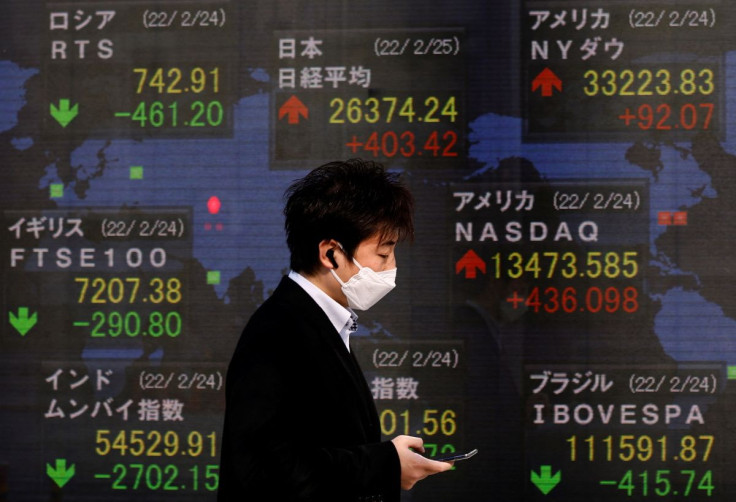Asia Shares Brace For Worst Month In 2 Years On Growth Fears, Dollar Buoyant

Asian shares clung on to small gains on Friday thanks to a solid Wall Street session, but were still set for their worst month in two years, as China growth fears and looming U.S. rate hikes dragged on sentiment and sent the safe-haven dollar soaring.
MSCI's broadest index of Asia-Pacific shares outside Japan rose 0.2% on Friday, after robust earnings from Facebook parent Meta Platforms had driven the Nasdaq 3% higher overnight. [.N]
Japanese markets are closed for a holiday.
Overall sentiment was still fragile with Nasdaq futures off around 1% in early Asia trade, pressured by disappointing earnings from Amazon after market close.
Friday's gains were marginal compared to the brutal sell-offs in globally stocks in recent weeks. The Asian regional benchmark is heading for a 2% decline this week and a 7.3% drop for the month, its worst month since March 2020.
Shanghai stocks rose 0.2% on Friday, but are set for an 8.1% fall for the month, their worst since January 2016.
"There are four near term catalysts driving the market at the moment: U.S. earnings which we are about half way through, rising U.S. Treasury yields and lots of hawkish speak from the Fed, the war Ukraine, and China policy," said Fook-Hien Yap, senior investment strategist at Standard Chartered Wealth Management.
One key focus is the upcoming meeting of China's Politburo, the nation's highest decision-making body, as markets look for more signs of economic support. But analysts say Beijing's zero-COVID strategy restrict policymakers' options as supply chains are in disarray, while operations in many factories and peoples' movements have been curtailed.
Beijing closed some schools and public spaces on Thursday, as most of the Chinese capital's 22 million residents turned up for more mass COVID-19 testing aimed at averting a Shanghai-like lockdown.
U.S. treasury yields were trading within their recent ranges, a little shy of their peaks hit last week.
The benchmark 10 year yield finished the U.S. session at 2.8205%, having reached as high as 2.981% on April 20. The two year yield was at 2.6132%. [US/]
They didn't trade in Asia on Friday due to the holiday in Tokyo.
This week has also been a volatile one for currencies.
The dollar index, which tracks the greenback against six major peers was a whisker softer at 103.56, having hit 103.93 on Thursday, its highest level since late 2022.
The index's current monthly gain of 5.2% would be its best since 2012.
On top of the safety-bid for the dollar, the rally has also been fed by market expectations for 150 basis points of rate hikes in just three Federal Reserve meetings. The aggressive Fed tightening path, mainly to curtail sky high inflation, far out paces other global central banks.
The dollar's recent gains have been most significant against the yen, and it swept past the key psychological 130 yen level on Thursday, setting a fresh 20 year high. The dollar also scored a five year high on the euro. [FRX/]
Oil prices remained choppy as traders grappled with the supply issues stemming from the war in Ukraine as well as the demand impact of lockdowns in China.
Brent crude fell 0.55% on Friday to 107.00 per barrel, but still set for its fourth straight month of gains. U.S. crude lost 0.6% to $104.68. [O/R]
Spot gold rose 0.36% to $1901.8 an ounce. [GOL/]
(Editing by Shri Navaratnam)
© Copyright Thomson Reuters 2024. All rights reserved.



















